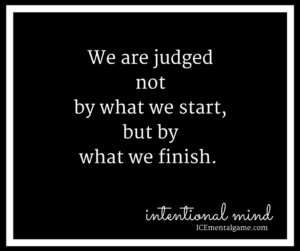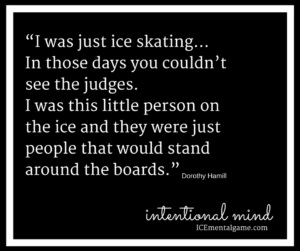 For figure skaters, dealing with the disappointment of poor results in a competition event can cause a lot of stress.
For figure skaters, dealing with the disappointment of poor results in a competition event can cause a lot of stress.
This stress can be managed, even eliminated if a parent or a coach is present to gently point out the opportunities for learning and improving instead of compounding the disappointment by adding their own negative opinions about the outcome.
If fact often, to their children, adult negative reaction can be worse than the results themselves.
Many skaters above all want to please their parents and coaches. They often feel that their parent or coach will be mad at them for popping a jump or making a mistake. This can set them up for unnecessary anxiety.
Parents and coaches, want to be a positive force in their child’s growth and development in all aspects of life including sports, but many of their less than stellar moments take place around competitions.
Emotions run high before, during, and after competitions. In a judged sport such as Figure Skating or Gymnastics, there is always the human factor of “subjectivity” in the judging.
Most skaters have skated a competition or two under the 6.0 Judging System. You know, the one where the ranking of the 3 or 5 person judging panel for the same performance by the same skater ranged from 1 to 7. “What was that judge thinking?”
What do you say to your child when you see this sort of result and are puzzled by it yourself? Remember, we teach by example.
- Focus on what you can control.
- We can’t control who the judges are or what scores they give.
“That judge doesn’t like me, they always put me last.”
Judges don’t judge you as a person. They judge how you execute your skills for one program or test. Each judge looks for basic criteria in each element, however there is room for personal preference based on the judges experiences. A judge who is a national or international judge will have a different point of reference than a strictly local competition judge.
I had a skater who never earned a “pass” during various moves in the field test by a particular judge. This judge is known to be very exacting and detailed. Imagine the feeling of accomplishment when he not only earned a “pass” but also a personal handshake and “well done” from this Judge on his senior moves in the field test.
If a judge consistently places your efforts lower than others, you can see the situation as a challenge to improve rather than an unfairness to be suffered.
Figure Skating is a mixture of technique and artistry, and is a judged spo rt. Even with the most sophisticated point system, there will always be some subjectivity. From the very beginning levels where the “cute factor” rules–up to the international level where each country might value different aspects of performance. This is a fact.
rt. Even with the most sophisticated point system, there will always be some subjectivity. From the very beginning levels where the “cute factor” rules–up to the international level where each country might value different aspects of performance. This is a fact.
At a seminar on the IJS for parents and skaters, Ann Barr, Chair of Singles Committee, USFS, was asked about this the disparity in scores across judges. She summed it up by saying, “This is Figure Skating, it is not going away.”
In other words:
Focus on what you can control.
Teach your child to respect the system they are in. Your child chose figure skating. If they continue to skate, they will need to learn to work within the system.
No matter how frustrated you are with the system, choose your remarks carefully. You want to foster a focus on what you can do–attitude. Make sure your words reflect encouragement and possibility based on self-determination, rather than helplessness.
Parents and coaches, communicate clearly to your skater. Let them know that you are not “mad” at them. Encourage them to learn from their mistakes and be there for them when they need a shoulder to cry on, then help them get back on track to future improvement.
The best skaters make no excuses. They follow this wise advice:
“Perform lights out and leave no room for doubt in their minds.”
Figure skating parents, help your athlete during competition by managing your stress and worry. Download your copy of the Figure Skating Competition Money and Time Saving Tricks eBook complements of ICE Mental Game.
